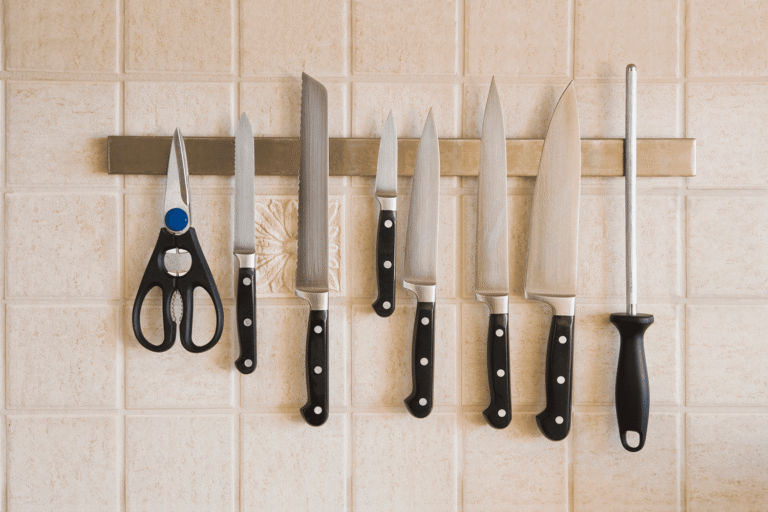If you cook often, you know how frustrating it is when your knives lose their edge. A dull knife doesn’t just make cooking harder—it’s actually more dangerous. That’s why knowing how to keep your knives sharp longer is an essential skill for any home cook or professional chef. With the right habits, tools, and care, you can extend the life of your knives and keep them performing like new. In this guide, we’ll explore proven tips on knife care, why regular maintenance matters, and when to consider professional help like Sydney knife sharpening services.
Why Sharp Knives Matter
Before learning how to keep your knives sharp longer, it’s important to understand why sharp knives are better. A sharp knife cuts with less force, reducing slips that can cause injuries. It also makes chopping, slicing, and dicing quicker and easier. Another benefit is food quality. The sharp blades make clean cuts that preserve texture and flavor. Simply put, keeping your knives sharp is about both performance and safety.
Best Practices on How to Keep Your Knives Sharp Longer
One of the easiest ways to dull a knife is by cutting on the wrong surface. Avoid glass, granite, or metal cutting boards. Instead, choose wood or plastic boards as these are gentle on your blades and help preserve sharpness.
Another simple tip is to wash knives by hand instead of putting them in the dishwasher. Dishwashers expose knives to high heat, harsh detergents, and rough handling, which can dull or damage blades. Always wash knives by hand with mild soap and water, then dry immediately.
Storing knives properly is also crucial. Tossing them in a drawer lets the edges bang against other utensils, ruining the sharpness. Use a magnetic strip, knife block, or blade guards to protect the edge and keep knives in top condition.
Honing your knife regularly is one of the best ways to extend its life. A honing rod doesn’t grind away metal but straightens the blade’s edge. Using a honing steel once or twice a week keeps knives aligned and prevents them from feeling dull too soon.
Even with the best care, knives eventually need sharpening. For most home cooks, sharpening every few months is enough. You can use a whetstone or a pull-through sharpener at home, but nothing beats professional services like blade sharpening for restoring a perfect edge.
It’s also important to avoid using your knife on hard foods like bones, frozen items, or anything that could chip the blade. Always use the right knife for the right task—for example, a cleaver for bones instead of a chef’s knife. Handling knives with care is another habit that makes a difference. Avoid scraping food off a cutting board with the knife’s edge or twisting the blade while cutting. Always treat your knife as a precision tool.
Everyday Tips on How to Keep Your Knife Sharp
Small daily habits help a lot when learning how to keep your knives sharp longer. Dry knives immediately after washing to avoid corrosion. Use knives only for their intended purpose. Make honing a regular part of your cooking routine instead of waiting until knives become very dull. These simple steps are the foundation of learning how to keep your knife sharp and making them last longer.
When to Call Professionals
Even with perfect maintenance, there comes a point when your knives need professional attention. Services like blade sharpening use specialized equipment to restore blades to factory sharpness. If your knife drags while cutting or has visible nicks, it’s time to let an expert take care of it. Professional blade sharpening can often extend the lifespan of your knife far beyond what at-home tools can do.
FAQs About Keeping Knives Sharp
Q1: How often should I sharpen my knives?
Most home cooks should sharpen their knives every 3–6 months, depending on use. Professionals may need sharpening more frequently.
Q2: Is honing the same as sharpening?
No. Honing realigns the blade’s edge, while sharpening removes metal to create a new edge. Both are important.
Q3: Can I sharpen knives at home?
Yes, you can use a whetstone or a pull-through sharpener. However, for precision, many people prefer professional blade sharpening.
Q4: What cutting board is best for knife care?
Wood and plastic boards are best. Avoid glass, marble, or metal surfaces.
Q5: Why do dull knives feel more dangerous?
Because they require more force, increasing the risk of slipping and accidental cuts.
Conclusion
Learning how to keep your knives sharp longer doesn’t take much effort, but it pays off in safety, performance, and the enjoyment of cooking. By using proper cutting surfaces, storing knives correctly, honing regularly, and seeking professional help when needed, you can extend the life of your knives dramatically. Whether you sharpen at home or rely on expert Sydney knife sharpening, a little care goes a long way.

